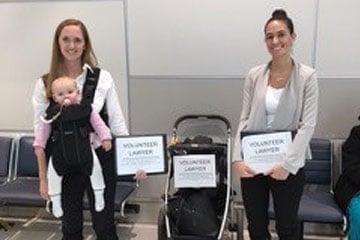When a crisis arose in airports across the world in the wake of U.S. President Donald Trump’s travel ban in June of 2017, hundreds of lawyers from across Canada mobilized to help those in need.

When a crisis arose in airports across the world in the wake of U.S. President Donald Trump’s travel ban in June of 2017, hundreds of lawyers from across Canada mobilized to help those in need.
The Canadian Cross-Border Legal Coalition were honoured this week for their work providing legal aid to people affected by the ban. They received the Ontario Bar Association’s President’s Award, which commends an organization that has contributed to the advancement of justice in Ontario or elsewhere. They were recognized by the association’s president, Quinn Ross, for their efforts to provide legal knowledge and document the experiences of those people stranded in airports and foreign countries during the ban.
“The CCBLC just jumped in and just did the best that lawyers do,” says Ross. “They went where the need was and they ensured to the extent possible that people who were being marginalized by the unjust and ill conceived executive orders were provided the best possible help.”
Erin Simpson, a member of the national executive for the Canadian Association of Refugee Lawyers and a coordinator for the CCBLC, said she is pleased that the organization is being recognized for their work because it was the effort of many people coming together to do something good.
“It really was a cast of thousands who put together this coalition,” she says. “It was just such an impressive collaboration among organizations, individual lawyers and so many lawyers across the country who really showed up.”
The first executive of order of the Trump presidency banned the travel of foreign nationals from Yemen, Sudan, Libya, Somalia, Syria, Iran and Iraq into the United States for 90 days and suspended a refugee program for 120 days. When it came into effect, administrators at airports had to interpret and enforce a complicated piece of policy, and the lawyers from the CCBLC knew that they would need to be on hand as a “watchdog,” in addition to providing legal advice to people who were stranded.
“There were so many questions,” says Simpson. “So, I think one of the most important roles was being present, being able to report on what was happening, how it was being interpreted by airlines, by border guards, by all the people who really have an important role in that.”
Corey Shefman, an associate at Olthuis Kleer Townshend LLP, was the coordinator for the Toronto operation of the CCBLC. He was among the first group of lawyers who mobilized to Pearson International Airport.
“People were scared,” he says. Information was in short supply, and no one was sure of the exact reach of the executive order. Travellers affected were grateful to see the table of volunteer lawyers waiting at each terminal, ready to help.
“I think that was really the thing that stuck with our volunteers,” says Shefman. “That, in the grand scheme of their day, it was not a big deal, but for the people who saw that they had supporters, it really did make a difference.”
Over 400 lawyers volunteered in Toronto alone. Shefman estimates that there were also “another couple hundred” in cities like Montreal, Vancouver, Winnipeg, and in the Niagara region.
“There were people from every corner, and every kind of lawyer from the biggest firms to the sole practitioners,” says Shefman. “Everyone came together and went out, at four in the morning sometimes, to be there for people who were impacted by the ban.”
Although the original version of the travel ban has lifted, the Supreme Court of the United States will discuss the fate of the third version of the executive order this week. CCBLC is still working to find those affected by the ban and connect them to local legal aid resources, and compile their stories to use as evidence before the courts. Simpson says that the OBA President’s Award will bring awareness to the ongoing efforts of the CCBLC.
“We feel that this a tremendous opportunity to really further that work and we’re so grateful for that,” she says.










